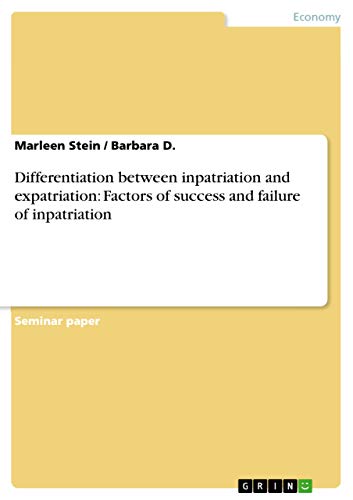Artículos relacionados a Differentiation between inpatriation and expatriation:...
Differentiation between inpatriation and expatriation: Factors of success and failure of inpatriation - Tapa blanda

"Sobre este título" puede pertenecer a otra edición de este libro.
- EditorialGRIN Verlag
- Año de publicación2011
- ISBN 10 3640935209
- ISBN 13 9783640935208
- EncuadernaciónTapa blanda
- Número de edición2
- Número de páginas56
Comprar nuevo
Ver este artículo
Gastos de envío:
EUR 23,00
De Alemania a Estados Unidos de America
Los mejores resultados en AbeBooks
Differentiation between inpatriation and expatriation: Factors of success and failure of inpatriation
Descripción Taschenbuch. Condición: Neu. This item is printed on demand - it takes 3-4 days longer - Neuware -Seminar paper from the year 2011 in the subject Leadership and Human Resource Management - Miscellaneous, grade: 1,5, European School of Business Reutlingen, language: English, abstract: IntroductionIn the globalized world the competition gets aggravated and multinational companies (MNCs) seek out for new practices to stay competitive. One solution is cognitive and cultural diversity, implemented by multicultural management teams. Nevertheless a prerequisite is that international human resource management (IHRM) and the strategic goals of the organization will be linked (Harvey, Speier, Novicevic 1999b). This is necessary for the development of a distinctive competency, which constitutes a competitive advantage through diversity. Diversity prevents groupthink and facilitates a repertoire of different strategic choices, which is crucial to stay competitive.To approach this goal, MNCs avail themselves of international assignments, meaning to require an employee (manager) to work abroad for a specific purpose. The different purposes of international assignments will be examined in chapter 2.3.There are two typical forms of international assignments: expatriation and inpatriation.This paper examines the inpatriation process, concerning:- the different assignee types- the differentiation between inpatriation and expatriation- the purpose of international assignments, especially inpatriation- the advantages of inpatriation compared to expatriation and vice versa- motives, expectations and challenges of inpatriation from different points of view- preparation by the inpatriate- cultural challenges (culture shock) and coping tips- preparation, assistance/support and training for the inpatriate and factors which haveto be consideredThis paper will conclude what factors make the inpatriation successful, and what can lead to failure.[.] 28 pp. Englisch. Nº de ref. del artículo: 9783640935208
Differentiation between inpatriation and expatriation: Factors of success and failure of inpatriation
Descripción Condición: New. Nº de ref. del artículo: ABLING22Oct2018170261480
Differentiation between inpatriation and expatriation: Factors of success and failure of inpatriation
Descripción Condición: New. Nº de ref. del artículo: I-9783640935208
Differentiation between inpatriation and expatriation: Factors of success and failure of inpatriation
Descripción Taschenbuch. Condición: Neu. Druck auf Anfrage Neuware - Printed after ordering - Seminar paper from the year 2011 in the subject Leadership and Human Resource Management - Miscellaneous, grade: 1,5, European School of Business Reutlingen, language: English, abstract: IntroductionIn the globalized world the competition gets aggravated and multinational companies (MNCs) seek out for new practices to stay competitive. One solution is cognitive and cultural diversity, implemented by multicultural management teams. Nevertheless a prerequisite is that international human resource management (IHRM) and the strategic goals of the organization will be linked (Harvey, Speier, Novicevic 1999b). This is necessary for the development of a distinctive competency, which constitutes a competitive advantage through diversity. Diversity prevents groupthink and facilitates a repertoire of different strategic choices, which is crucial to stay competitive.To approach this goal, MNCs avail themselves of international assignments, meaning to require an employee (manager) to work abroad for a specific purpose. The different purposes of international assignments will be examined in chapter 2.3.There are two typical forms of international assignments: expatriation and inpatriation.This paper examines the inpatriation process, concerning:- the different assignee types- the differentiation between inpatriation and expatriation- the purpose of international assignments, especially inpatriation- the advantages of inpatriation compared to expatriation and vice versa- motives, expectations and challenges of inpatriation from different points of view- preparation by the inpatriate- cultural challenges (culture shock) and coping tips- preparation, assistance/support and training for the inpatriate and factors which haveto be consideredThis paper will conclude what factors make the inpatriation successful, and what can lead to failure.[.]. Nº de ref. del artículo: 9783640935208
Differentiation between inpatriation and expatriation: Factors of success and failure of inpatriation
Descripción paperback. Condición: New. New. book. Nº de ref. del artículo: D8S0-3-M-3640935209-6

